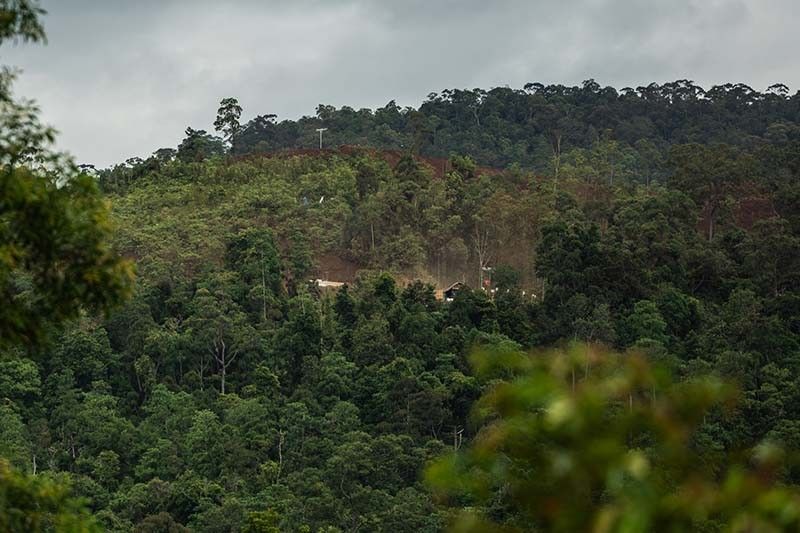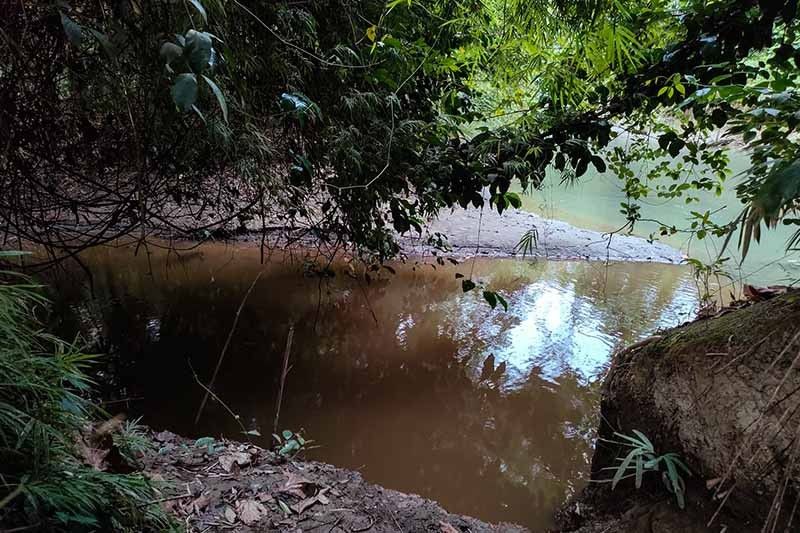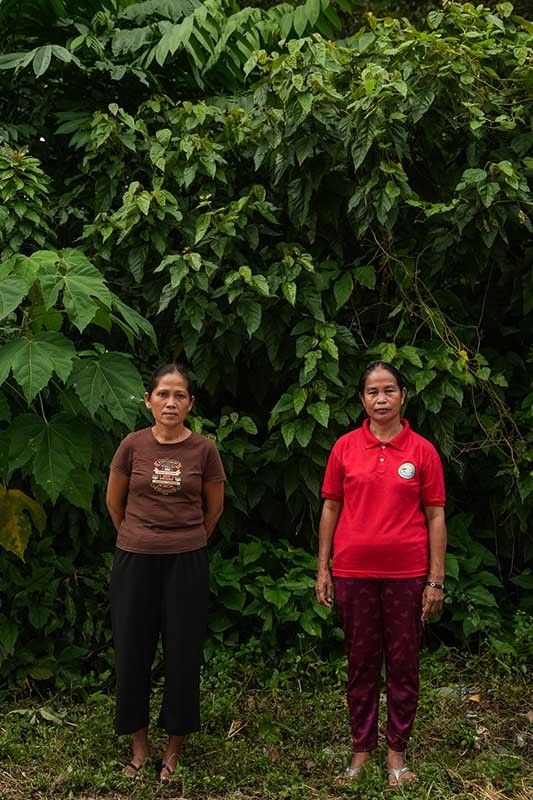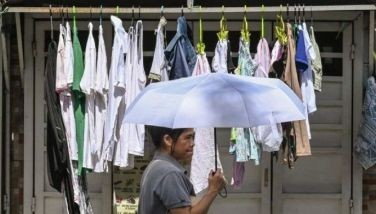Palawan folk fight for future as world scrambles for critical minerals

First of a two-part special report on extraction of critical minerals. Read the second story here
BROOKE’S POINT, Philippines — Moharen Tambiling, an indigenous Palaw’an, was once a supporter of a nickel mine on their ancestral land in southern Palawan. He was initially drawn in by the miner’s promises of job opportunities and development.
But Tambiling’s perspective shifted when he observed alleged irregularities in the free, prior and informed consent (FPIC) process for the mine. Then, the miner, Ipilan Nickel Corporation (INC), constructed a pier for transporting nickel ore in the area where he traditionally harvested lobsters, without consulting him.
The construction and the operation of the pier have made it difficult for residents of Barangay Maasin like Tambiling to fish and catch lobsters.
“It became clear to me that what they were saying about the project’s lack of [negative] effects was not true,” the 47-year-old indigenous community leader said.
“If this continues, not only our livelihoods will be affected, but also the town of Brooke’s Point,” he added.
As residents grapple with the consequences of mining in their town, the government’s pursuit of exploring and extracting minerals needed for the shift to clean energy, such as nickel, has raised concerns about the social and environmental costs of the scramble for renewable energy resources.
Global rush for clean energy metals
Countries are advancing the deployment of renewable energy to meet their national and global climate goals. The Philippines aims to reduce greenhouse gas emissions by 75% by 2030, with the government putting renewable energy at the forefront of slashing planet-warming emissions.
As nations transition to a low-carbon future, the demand for minerals such as nickel, copper and lithium—which are needed to manufacture electric vehicles and storage for power generated from renewables—is expected to skyrocket.
The Philippines is one of the nations most vulnerable to the impacts of climate change. It is also host to some of the largest global reserves of critical minerals crucial for the green transition. In 2022, the country was the second largest producer of nickel.
Environment Secretary Maria Antonia Yulo-Loyzaga earlier said that the agency will lead an extensive exploration for critical minerals.
Under its mineral production sharing agreement with the government, INC is exploring, developing and utilizing for commercial purposes nickel and other mineral deposits in Brooke’s Point. INC is an affiliate of Global Ferronickel Holdings, Inc. (FNI), the country’s second largest nickel ore exporter.
Currently, all extracted nickel ore from Brooke’s Point is being transported to China. INC has produced and shipped one million nickel ore to Guangdong Century Tsingshan Nickel Industry Co., Ltd. (GCTN), a Chinese ferronickel smelting plant, since its maiden operations in September 2022. FNI holds a 20% investment interest in GCTN.
GCTN is exploring turning ferronickel into nickel matte—a battery grade nickel material—in a bid to enter the battery sector. FNI said the company plans to implement this process in the Philippines if the preliminary study proves successful.
But Brooke's Point residents, particularly indigenous Palaw’ans, and the local government are strongly opposing the continued operations of the mine.
Cesareo Benedito Jr., the town mayor, stressed that the geographical landscape of Brooke’s Point is “not suitable” for the extraction of such minerals.
“In other places, it may be possible, but here in our area, it’s not.”
Mining vs agriculture, environment

In Brooke’s Point, the roads are shaded by vast swathes of coconut trees, earning it the title of the “coconut capital” of Palawan. It is also known as the province’s “food basket,” thanks to its extensive rice fields.
For Vice Mayor Mary Jean Feliciano, agriculture and mining “cannot coexist” in Brooke’s Point.
“Hectares of farmlands can no longer be planted with rice because roads were built in the middle. Farmers can’t even enter there,” she said.
In 2021, the Office of the Ombudsman issued a suspension order to Feliciano, then the town mayor, for “grave abuse of authority” after she suspended INC’s operations and directed the demolition of several mining structures. Feliciano was elected vice mayor in 2022, and in the following year, the Ombudsman overturned its decision.
Brooke’s Point is also home to Mt. Mantalingahan, the highest mountain in Palawan and a protected area. Palaw’ans consider it sacred and have depended on its forests and watersheds for food, water and livelihoods. INC’s mine site is within Mt. Mantalingahan.
“We don’t want our mountains destroyed. First and foremost, that’s where we get our livelihoods. Second, we consider the mountains and forests our pharmacy because of the medicinal herbs. Everything we need is there,” Nolsita Siyang, 52, an indigenous leader from Brgy. Aribungos, said.
Residents and the local government also attributed the deeper, muddier floods that inundated their homes and livelihoods to the mine and the deforestation caused by the firm’s tree-cutting activities.
Tambiling noted that flooding occurs in Brooke’s Point, but said that “not on such a large scale” like what happened in December 2022 and January this year.
Last August, the Supreme Court issued a writ of kalikasan against the Department of Environment and Natural Resources and Mines and Geosciences Bureau as well as INC and Celestial Nickel Mining and Exploration Corporation, another company operating in Mt. Mantalingahan. The writ is a legal remedy for persons or organizations whose constitutional right to a balanced and healthful ecology is violated or threatened.
In a release, the court said that it found that mining operations by INC and Celestial Mining “may cause irreparable environmental damage” to the Mt. Mantalingahan protected area and the ancestral domain of Palaw’ans. It also said that extraction of nickel, “as exacerbated by the lack of action by the DENR and MGB, places the residents of Brooke’s Point in peril.”
According to INC, it has already provided evidence to the Supreme Court to dispel concerns about the impacts of its operations on the environment. Palawan is known as the last ecological frontier of the Philippines.
“It remains resolute in aligning its operations with the highest environmental and ethical standards, promoting sustainable practices and regulatory compliance,” INC resident mine manager Alex Arabis told Philstar.com.
Local resistance

Since 2012, Siyang, the woman leader, has been an outspoken opponent of mining in her hometown. She stressed that she is not against development projects, and acknowledges the crucial role of nickel in the society.
But after witnessing the detrimental effects of mining on the environment and the relationship of the Palaw’an community, the mother of four could not stand idly by.
“When the mine arrived, that’s when, if I may say, our lives began to resemble hell. It wasn’t just us; even the youth felt it. We’re now divided into two. Even our agriculture and traditions were torn apart,” she said.
Earlier this year, Siyang was one of the residents who protested against INC’s operations by picketing outside the company gate and blocking the passageway of trucks from the mine’s upper stockpile—a move allowed by the local government.
In April, the security guards of INC dismantled the human barricade, leading to the arrest of and filing of cases against some of the protesters. This prompted church leaders in Palawan to call on the government to halt the operations of INC and other mining companies in watersheds and protected areas in Palawan.
Even after the barricade was dismantled, Siyang vowed to continue her fight against the mines as long as she is alive for her children.
The National Commission on Indigenous Peoples (NCIP) issued a cease and desist order (CDO) against INC last August, citing the company’s failure to secure the necessary FPIC. INC, however, disputed this.
While the issuance was seen as a victory, residents perceive the stoppage order as a long-overdue decision that could have been made earlier to prevent destruction to the environment and preserve the relationship among Palaw’ans.
“Why did they only release such an order now when they knew they could have done it earlier? It’s painful; significant damage has already occurred, and only now do they make a decision,” woman leader Norima Mablon, 43, said.
The Brooke’s Point government issued a stoppage order against the mining firm last October, stating that INC has been blatantly defying the issuance of the NCIP and the initial CDO ordered by the local government. However, INC claimed that only the DENR can halt its mineral operations and cancel the MPSA.
Priceless

The mining company said that it provides jobs, scholarship grants and donates school supplies, rice harvesters, fishing boats and medicines to residents of Brooke’s Point. It has also constructed covered courts, as well as education and health facilities.
However, for anti-mining residents, the opportunities provided by the company do not guarantee the long-term improvement of the community. Mablon pointed out that what they want is an intact environment, not just the promised benefits.
“Our current concern, if this continues, is clean drinking water. Let’s say, even if you have money and a job, where will that take you? Until when?” she asked.
Palawan-based Environmental Legal Assistance Center stressed that the scramble for clean energy minerals should take into consideration biodiversity and the people’s livelihoods and health.
“If you continue to just mine nickel ore all over the world, particularly in areas rich in biodiversity, how can justice be achieved? It cannot be a just transition if host communities are ravaged by food and watersheds are disappearing,” ELAC executive director Gerthie Mayo-Anda said.
Whenever he is at the coast of Maasin, the ship transporting nickel ore to China has become a familiar sight for Tambiling, the lobster harvester, since September last. For him, the vessel is a reminder of the “challenges” that the community faces.
Tambiling said that INC offered him compensation for the destruction caused by the construction of their pier on his lobster farm. However, he stressed that the impacts of the mine cannot be compensated.
“They have destroyed our tradition and culture. Those are priceless,” he said.
— This story was supported by Climate Tracker Asia and Oxfam.
- Latest
























